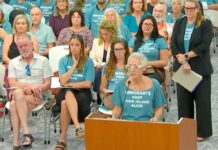If push came to shove during a hurricane, could we all get out on time? What if there were more people to evacuate? That was the initial question at the administrative appeal case over 1,300 building permits for workforce housing.
In May 2018, as a response to Irma and the shortage of workforce housing, then-Governor Rick Scott directed the Department of Economic Opportunity (DEO) to allocate 1,300 new permits to local governments to address the dire lack of workforce housing in the Keys.
Marathon, Key West and Islamorada all accepted their maximum 300 permits allocation and began to amend their comprehensive plans to allow for the additional units. In November 2018, three residents independently challenged these decisions. The challenges were bundled into one hearing, which took place in Marathon last week.
State-wide, building permits are limited by ROGO to ensure timely evacuation, said George Garrett, the City of Marathon planning director. A 2012 hurricane evacuation study estimated that it would take 17.5 hours to evacuate visitors during Phase 1 preceding a hurricane and 17.5 hours to evacuate permanent residents during Phase 2. Florida statutes require safe evacuation of visitors and residents within 24 hours each, so 48 hours total. The gaps between the 17.5 hour estimates and the 24 hour statutory requirements justified the DEO’s issuance of the 1,300 additional permits. Garrett said, “They estimated it would take about 17.5 hours to evacuate everyone in the Keys. The statutory requirement is 24 hours, so 6.5 hours leeway equates to additional cars on the roads, which equates to additional housing being allocated.”
The municipalities even contemplated placing deed restrictions on the new permits, requiring residents and tenants to evacuate during Phase 1 (generally for visitors) instead of Phase 2 (generally for permanent residents) to ease the burden on the roads during an emergency.
Garrett explained how the face of the administrative challenge was all about the timing of this safe evacuation. Asking permanent residents to evacuate during Phase 1 instead of Phase 2 “cheated” statutory requirements, argued petitioners. Garrett disagreed. He said, “Ok, so you’re going to tell me, even if we have to evacuate our permanent population safely, I’m prohibited from telling people to leave early?” Garrett noted that Marathon already asks some permanent residents living in low-lying homes to leave early, and has since the 2012 study.
As the hearing wore on, it became clear that there were more than hurricanes on people’s minds. Because the Keys are an Area of Critical State Concern, changes to comprehensive plans are reviewed against the principles of environmental capacity, water quality and habitat protection, Garrett said. Petitioners argued that the Keys are at, or beyond, their carrying capacity and that the additional housing permits should be denied.
The additional arguments forced Marathon city attorney David Migut to request an increased ceiling on legal fees up to $350,000 from the city council. “I hope the fees don’t get that high,” said Migut. “Now we’re at or slightly above $200,000, but they’ve made more arguments, and we have to address those.” Garrett agreed, “We did not anticipate the case going the way it has gone. I don’t know if they did, either. We probably spent more time dealing with water quality stuff in hearings last week than we did with other aspects, like actual hurricane evacuation.”
Garrett said the core issue is the lack of workforce housing in the Keys. He said, “At this point, we have very limited additional workforce housing allocations and we have a significant workforce housing deficit.”
This dearth is what prompted the issuance of the 1,300 permits in the first place and motivates the municipalities’ argument. While hurricane evacuation, water quality and carrying capacity must be considered, the cities argued that each of their decisions to accept their 300 units was not only legal, but necessary in order to keep workers in local businesses. Garrett said, “It really is a workforce issue, and at that point, it becomes an issue of sustaining the economy.”
Now that the hearing is finished, the 15,000-odd pages of evidence will be analyzed along with court transcripts. The next steps are receipt of the final transcript within 30 days. Then, both parties will have 30 days to propose their recommended order to the judge. She can utilize one, both, a combination, or none of the recommendations in issuing her recommended order to the DEO. Finally, the secretary of the DEO will issue a final order. Garrett expects that to come in April 2020.
Garrett noted that, if successful, Marathon was eager and ready to utilize their allotment. “We cannot issue building rights if we don’t have permits. So, the developers are sitting there waiting.” Marathon has approximately 220 units that have already been approved for site planning and that are ready to be developed. All that’s needed to start building is a building allocation.
The BOCC is waiting to see the outcome of the administrative appeal before accepting the county’s 300 on behalf of unincorporated Monroe. Smaller municipalities like Key Colony Beach and Layton received a combined 100 units.
If this outcome is appealed as a matter of law, the 1st District Court of Appeals in Tallahassee will have to hear the case.























